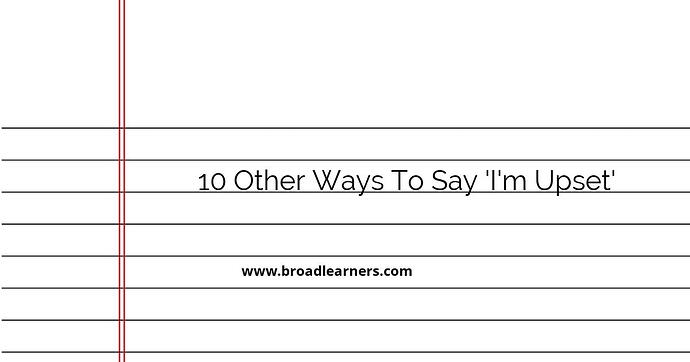Feeling upset is a common emotion that everyone experiences from time to time. However, using the same phrase over and over again can make your communication repetitive and less impactful. So, if you're looking for alternative ways to express your feelings of being upset, here are 10 other phrases you can use:
- I'm disappointed
- I'm frustrated
- I'm annoyed
- I'm angry
- I'm irritated
- I'm bothered
- I'm hurt
- I'm saddened
- I'm troubled
- I'm distressed
Each of these phrases conveys a slightly different shade of upset, allowing you to accurately express your emotions in various situations. Let's explore each phrase in more detail:
1. I'm disappointed
When you say "I'm disappointed," you are expressing your feelings of sadness or displeasure about something that didn't meet your expectations. It implies that you had higher hopes or anticipated a different outcome.
Example: I'm disappointed that I didn't get the promotion I was hoping for.
2. I'm frustrated
If you say "I'm frustrated," you're conveying a sense of annoyance or exasperation due to a difficulty or obstacle that you're facing. It suggests that you're feeling stuck or unable to make progress.
Example: I'm frustrated with the slow progress on this project.
3. I'm annoyed
When you're annoyed, you're expressing mild anger or irritation towards someone or something that is bothering you. It implies that you're finding the situation or behavior unpleasant.
Example: I'm annoyed that my neighbor keeps playing loud music late at night.
4. I'm angry
Saying "I'm angry" indicates a stronger feeling of displeasure or rage. It suggests that you're experiencing intense emotions due to a perceived injustice or wrongdoing.
Example: I'm angry about the way I was treated in that meeting.
5. I'm irritated
If you're irritated, you're expressing a feeling of annoyance or impatience towards someone or something that is causing you discomfort or frustration. It implies a lower level of anger compared to being angry.
Example: I'm irritated by the constant interruptions during my work.
6. I'm bothered
Saying "I'm bothered" means that something is causing you unease or distress. It suggests that a particular issue or behavior is affecting you emotionally or mentally.
Example: I'm bothered by the lack of communication in our team.
7. I'm hurt
If you say "I'm hurt," you're expressing emotional pain or distress caused by someone's words or actions. It indicates that you feel wounded or betrayed.
Example: I'm hurt by the way you spoke to me earlier.
8. I'm saddened
When you're saddened, you're expressing a deep feeling of sorrow or grief. It suggests that something has deeply affected you and brought about a sense of sadness.
Example: I'm saddened by the news of my friend's passing.
9. I'm troubled
Saying "I'm troubled" means that you're feeling uneasy or disturbed by something. It implies that you're troubled by a particular issue or situation that is causing you distress.
Example: I'm troubled by the current state of affairs.
10. I'm distressed
If you're distressed, you're expressing a higher level of emotional pain or suffering. It suggests that you're experiencing extreme discomfort or anguish.
Example: I'm distressed by the recent turn of events.
By using these alternative phrases, you can effectively communicate your feelings of being upset while adding variety and depth to your expressions. Consider the context and choose the phrase that best captures your emotions in a given situation.
Did I miss anything? Respond below
